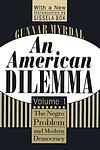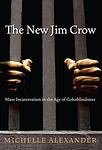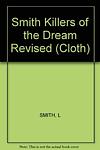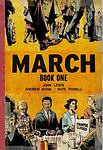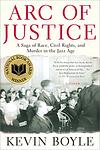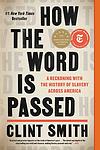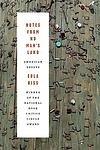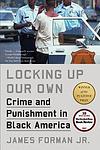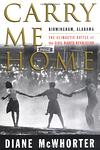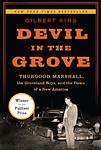The Greatest "American History, Race Relations" Books of All Time
Click to learn how this list is calculated.
This list represents a comprehensive and trusted collection of the greatest books. Developed through a specialized algorithm, it brings together 300 'best of' book lists to form a definitive guide to the world's most acclaimed books. For those interested in how these books are chosen, additional details can be found on the rankings page.
Genres
The "American History" category encompasses a broad range of books that delve into the events, figures, and forces that have shaped the United States from its pre-colonial days to the present. This genre includes works on pivotal moments such as the American Revolution, Civil War, and civil rights movements, as well as studies of political, social, and cultural developments across various eras. It covers biographies of influential leaders, analyses of policy changes, and examinations of societal shifts. Whether providing comprehensive overviews or focusing on specific incidents or decades, books in the American History category aim to illuminate the complexities of the nation's past, offering readers insights into the events that have defined the American experience and the context for its ongoing evolution.
The category of "Race Relations" in books refers to literature that explores the complex and often fraught interactions between people of different racial and ethnic backgrounds. These books may examine issues such as prejudice, discrimination, and inequality, as well as the ways in which individuals and communities navigate these challenges. They may also explore themes of identity, belonging, and cultural exchange, offering insights into the diverse experiences of people from different racial and ethnic backgrounds. Overall, the category of "Race Relations" seeks to promote greater understanding and empathy across racial and ethnic lines, and to encourage dialogue and engagement around issues of race and diversity.
Countries
Date Range
Reading Statistics
Click the button below to see how many of these books you've read!
Download
If you're interested in downloading this list as a CSV file for use in a spreadsheet application, you can easily do so by clicking the button below. Please note that to ensure a manageable file size and faster download, the CSV will include details for only the first 500 books.
Download-
1. The Souls of Black Folk by W. E. B. Du Bois
This seminal work is a collection of essays that explores the history and condition of African Americans at the turn of the 20th century. It delves into the issues of race, class, and the socio-economic realities faced by black people post-emancipation. The author employs a combination of history, sociology, and personal narrative to present a powerful critique of American society, highlighting the struggle for civil rights, the importance of black spirituals, and the concept of "double consciousness" - the idea of viewing oneself through the lens of a society that sees you as inferior.
-
2. Life on the Mississippi by Mark Twain
This book is a semi-autobiographical account of the author's experiences as a steamboat pilot on the Mississippi River before the American Civil War. It provides a detailed and humorous depiction of life and society along the river, including the author's own journey from an eager young apprentice to a seasoned riverboat pilot. The book also includes a travelogue of a journey down the Mississippi River much later in life, offering a look at the dramatic changes brought about by industrialization and the Civil War.
-
3. The Fire Next Time by James Baldwin
This book is a powerful exploration of race relations in America in the early 1960s. The author presents his experiences and observations in the form of two essays. The first is a letter to his 14-year-old nephew, discussing the role of race in American history. The second essay takes a broader look at the civil rights movement and the author's own experiences with religion and identity. Throughout, the author presents a passionate plea for the recognition of the humanity and dignity of all people, regardless of race.
-
4. Why We Can't Wait by Martin Luther King
This book is a powerful exploration of the civil rights struggle in the United States in the early 1960s, as seen through the eyes of one of its most prominent figures. It provides a historical context for the push for racial equality, including the role of nonviolent protest in achieving social change. The book also includes a detailed account of the 1963 Birmingham campaign, a pivotal moment in the civil rights movement, and presents a compelling argument for the urgency of addressing racial injustice.
-
5. An American Dilemma by Gunnar Myrdal
This book is a comprehensive sociological study on the issues faced by African Americans in the United States during the mid-twentieth century. The author examines the deep-rooted racial discrimination and inequality prevalent in American society, exploring its origins, implications, and potential solutions. The work is notable for its detailed analysis and its impact on subsequent civil rights movements.
-
6. Children of Crisis by Robert Coles
"Children of Crisis" is a deeply moving exploration of the lives of children in various challenging circumstances. The author, a renowned psychiatrist, documents his experiences working with children facing poverty, racial tension, and family disruption in the United States. The book provides insights into the resilience, adaptability, and strength of children, offering a profound understanding of their psychological responses to crisis and adversity.
-
7. The New Jim Crow by Michelle Alexander
"The New Jim Crow" is a thought-provoking and eye-opening book that examines the deeply ingrained racial bias within the American criminal justice system. Drawing on extensive research and personal anecdotes, the author explores how the War on Drugs has disproportionately targeted and marginalized Black communities, leading to a modern-day system of racial control and oppression. This powerful critique challenges readers to confront the systemic racism that continues to perpetuate inequality and injustice in the United States.
-
8. Parting the Waters by Taylor Branch
"Parting the Waters" is a comprehensive and engaging chronicle of the civil rights movement in America from 1954 to 1963. It offers an in-depth look into the lives of key figures such as Martin Luther King Jr., and their struggle to end racial segregation and discrimination. The narrative is filled with detailed accounts of major events from the Montgomery Bus Boycott to the March on Washington, providing a vivid picture of this pivotal era in U.S. history.
-
9. The Strange Career of Jim Crow by C. Vann Woodward
This historical analysis examines the history and development of racial segregation laws, known as "Jim Crow", in the United States. It explores the origins of these laws in the post-Civil War era, their enforcement in the South, and the eventual resistance and dismantling of them during the Civil Rights Movement. The book also challenges the perception that segregation was a natural outcome of racial tensions, instead arguing that it was a system carefully constructed by white elites to maintain economic and political control.
-
10. Common Ground by J. Anthony Lukas
"Common Ground" is a non-fiction book that provides an in-depth examination of racial tensions in Boston, Massachusetts during the 1960s and 1970s, primarily focusing on the controversial issue of court-ordered busing to integrate public schools. The narrative follows three families - one African-American, one Irish-American, and one Yankee - to depict the effects of these tensions on the city's different communities. The book also explores the historical, political, and social context of these events, offering a comprehensive analysis of a critical period in American history.
-
11. Killers of the Dream by Lillian Smith
"Killers of the Dream" is a non-fiction book that examines the roots of racism in the American South, particularly in the author's home state of Georgia. The author argues that segregation is not only harmful to black people, but also to whites, as it distorts their view of reality and their own humanity. The book explores the psychological, social, and cultural effects of racism, and calls for an end to racial discrimination and segregation.
-
12. March: Book One by John Lewis
"March: Book One" is a graphic novel that depicts the early life of a key figure in the American civil rights movement. Raised in rural Alabama, he grows up inspired by the activism surrounding the Montgomery Bus Boycott and the words of Martin Luther King Jr., which sets him on the path of nonviolent protest. The novel highlights his commitment to the fight for equal rights and his journey from a young boy on a farm to one of the key figures in the civil rights movement.
-
13. Arc of Justice by Kevin Boyle
"Arc of Justice" is a riveting and complex story that unfolds in the racially tense backdrop of 1920s Detroit. The narrative follows an African American physician who moves his family into a predominantly white neighborhood, resulting in a chain of violent events. The doctor stands trial for murder, and the case garners national attention. The book delves into the doctor's fight for justice and the broader societal implications of racial tension, prejudice, and civil rights in America.
-
14. A Testament of Hope: The Essential Writings and Speeches of Martin Luther King, Jr. by Martin Luther King
This book is a comprehensive collection of the significant writings and speeches of a renowned civil rights leader. It includes his most influential and inspirational works, such as the "I Have a Dream" speech and the "Letter from Birmingham Jail", among many others. The book provides a deep insight into his thoughts, philosophies, and strategies for nonviolent protests, and his passionate advocacy for equality, justice, and dignity for all. It serves as a testament to his enduring hope for a more inclusive and equitable society.
-
15. How The Word Is Passed: A Reckoning With The History Of Slavery Across America by Clint Smith
"How The Word Is Passed" is a powerful and thought-provoking exploration of the legacy of slavery in America. Through a series of vivid and evocative essays, author Clint Smith takes readers on a journey across the United States, visiting sites that are deeply connected to the history of slavery and its aftermath. From Monticello to Angola Prison, Smith offers a nuanced and insightful look at the ways in which slavery has shaped our country and continues to impact our lives today. With a clear-eyed and compassionate approach, "How The Word Is Passed" is a must-read for anyone interested in understanding the complex and ongoing legacy of slavery in America.
-
16. Notes from No Man's Land: American Essays by Eula Biss
"Notes from No Man's Land: American Essays" is a collection of essays that explores the concept of race in America. The author uses personal experiences, historical events, and cultural analysis to examine the complexities of racial identity, privilege, and the often unacknowledged history of racial violence in the United States. The book also delves into the author's own struggles with her white identity and how it intersects with her experiences of living in predominantly black neighborhoods.
-
17. Locking Up Our Own: Crime and Punishment in Black America by James Forman
This book delves into the complex and controversial issue of mass incarceration in the United States, particularly within the African American community. It explores the historical, social, and political factors that contributed to the high rates of black imprisonment. The author examines the role of African American leaders in advocating for tough-on-crime policies and their unintended consequences. The book is a thought-provoking analysis of the intersection of race, crime, and justice in America.
-
18. Slavery by Another Name by Douglas A. Blackmon
The book explores the concept of "neoslavery," which entrapped thousands of African Americans in the South in a system of forced labor after the Civil War. This system was perpetuated by local laws, racial prejudice, and economic manipulation, where black men were arrested on false charges, then sold to companies as cheap labor. The book illuminates the forgotten history of this "age of neoslavery" that persisted into the 20th century and its profound impact on the racial disparities that exist today.
-
19. Albert Murray: Collected Essays & Memoirs by Albert Murray
This collection of essays and memoirs by a renowned American literary and jazz critic offers a profound exploration of the African-American experience. The author's writings cover a wide range of topics, from music and literature to race and identity, providing readers with an insightful perspective on American culture. His memoirs offer a personal look into his own experiences and thoughts, further enriching his exploration of these themes.
-
20. Sons of Mississippi by Paul Hendrickson
"Sons of Mississippi" is a powerful exploration of the legacy of racism in the American South. The book uses a famous photograph of seven Mississippi sheriffs preparing to thwart James Meredith's integration of the University of Mississippi in 1962 as a starting point. The author then traces the lives and descendants of these men, providing a deep and nuanced look at the enduring effects of prejudice and discrimination, as well as the struggle for civil rights and racial equality in the United States.
-
21. The Color Of Law by Richard Rothstein
"The Color of Law" by Richard Rothstein explores the deeply ingrained history of racial segregation in the United States, particularly focusing on the role of government policies and practices. Through extensive research and analysis, Rothstein uncovers how discriminatory housing policies, such as redlining and racially restrictive covenants, were systematically implemented by federal, state, and local governments, perpetuating racial inequality and segregation. The book challenges the notion that segregation was solely a result of individual choices or private prejudices, emphasizing the significant role of government actions in shaping the racial landscape of America.
-
22. Carry Me Home by Diane McWhorter
"Carry Me Home" is a deeply researched historical account of the civil rights movement in Birmingham, Alabama, during the 1960s. The book provides a comprehensive look at the racial tensions and violence that marked this period, focusing on key events such as the bombing of the Sixteenth Street Baptist Church. The author, who grew up in Birmingham, also interweaves personal experiences and family history into the narrative, offering a unique perspective on the complex social and political dynamics of the time.
-
23. Devil in the Grove: Thurgood Marshall, the Groveland Boys, and the Dawn of a New America by Gilbert King
The book is a gripping account of the Groveland Boys, four African American men falsely accused of raping a white woman in Florida in 1949, and the efforts of Thurgood Marshall, a future Supreme Court justice, to defend them. The narrative delves into the depths of racial injustice and violence in the Jim Crow South, and shows how Marshall's fight for the Groveland Boys helped to lay the groundwork for the Civil Rights Movement and the desegregation of America.
-
24. Stamped from the Beginning: The Definitive History of Racist Ideas in America by Ibram X. Kendi
This book offers a comprehensive history of anti-Black racist ideas in America, tracing their development from the earliest days of the country to the present. It challenges the notion that racism is merely the product of ignorance and hatred, instead arguing that it is a powerful and enduring system of thought that has been deliberately constructed and maintained over centuries. The book also explores the complex ways in which racist ideas have been used to justify and perpetuate social, economic, and political inequalities.
-
25. Neither Black Nor White by Carl N. Degler
"Neither Black Nor White" is a comprehensive historical analysis of racial relations in Brazil and the United States. The book compares and contrasts the racial policies and societal attitudes in the two countries, arguing that Brazil's more fluid concept of race and less rigid segregation policies have resulted in a significantly different racial climate compared to the United States. The author uses historical data and sociological studies to support these claims, providing an in-depth look at the complexities of race relations in both countries.
Reading Statistics
Click the button below to see how many of these books you've read!
Download
If you're interested in downloading this list as a CSV file for use in a spreadsheet application, you can easily do so by clicking the button below. Please note that to ensure a manageable file size and faster download, the CSV will include details for only the first 500 books.
Download



